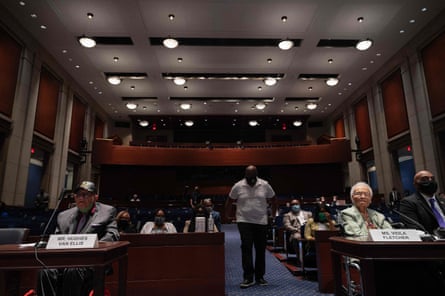You Call It “Florida,” I Call It “The Problem of Extinction Age Fascism”
What Do Politics Gone Haywire in an Age of Extinction Look Like? Take a Hard Look at Florida, and Then the World

Twitter's launch of DeSantis' presidential bid underscores platform's rightward shift under MuskWhat Do Politics Gone Haywire in an Age of Extinction Look Like? Take a Hard Look at Florida, and Then the World

Image Credit: Alyssa Pointer. Follow her here.
America’s got a problem. A Ron DeSantis problem. And we need to talk about it. What do I mean by that? It’s not what you think. Well, it’s not just what you think, really. I mean it in a bigger way. If you wanted an example of what negative, ruinous politics look like during the Age of Extinction, take a hard look at Florida.
DeSantis’s abuses of power are by now well established. A classic demagogue right down to, LOL, book bans. Criminalizing teachers, doctors, parents. Attacking kids. Building parallel institutions — reconstructing universities, constructing special police forces. The list goes on and on.
But the problem here is bigger than that. Much bigger.
DeSantis is 44 years old. He’s not going to win the next election. But he’s going to be around, a plague on America, for the next half a century. At some point, given enough backing from crackpot billionaires, a gullible media, and what we’re going to discuss next…he very well could win. Imagine that something happens to Trump, who’s getting well up there in years. Who’s the GOP front-runner then?
But it’s not even time scales that are the issue. It’s that DeSantis’s formula is working. It’s a template of regressive politics, modern day fascism, and it’s working all too well. Extinction Age fascism? Look no further than…Florida.
How long does Florida have? It’s anyone’s guess, given current rates of warming and sea level rise. Certainly, within the next decade or two, things will get…difficult. Very, very difficult. Already, insuring a home is problematic, expensive, if you can find someone to insure it at all.
And yet people are flocking to Florida. Why is that? Because of DeSantis’ formula. He’s cut taxes to the bone. Florida’s a handful of states with no state income tax.
Why does that work? Think about it. Time are tough. Incredibly tough. Real incomes are falling. Prices are skyrocketing. That, too, is an Extinction effect — climate change means we’re now running out of food, water, clean air, at a civilizational level, and so of course a relentless, never-ending inflationary wave is hitting us. That $5 or $10K you can save on state income tax? It’s a big deal, to most Americans. And so it’s not just people who are moving to Florida. It’s businesses, too. DeSantis knows he can attack Disney because, for example, plenty of hedge funds have moved in, as have health “insurers.”
DeSantis has made Florida economically attractive. At least in the short term. In an Age of Extinction, every penny you can save counts. Now, of course, it hardly takes a genius to see the problem that arises next: without a tax base, good luck having working infrastructure. And so Florida has some of the nation’s worst…from schools, to dams, to drinking water and so forth. But the long run doesn’t matter in this form of negative politics. It’s just about amassing power, now.
As people move to Florida, of course, there’s the threat of demographic change unseating a figure like a demagogue. But that threat’s often a hollow one, because — well, think about why those people moved there in the first place. For the short term gains. So if someone comes along and says, hey, I’m going to raise your taxes, so we can have decent infrastructure, and by the way, I’m going to undo all those book bans…how many votes are they really likely to garner?
This is how negative politics works. The economic short-termism goes hand in hand with the…fascism, more or less. I don’t know what else, really, to call book bans, criminalizing teachers, “don’t say gay,” and all the rest of it. It’s textbook neo-fascism, really, especially when you understand that the, uh, LOL, Nazis, began their attacks on civil society in much the same way.
So. Florida shows us a template of negative politics in the Age of Extinction. It goes like this. Hook people — who are growing poorer, fast, as inflation bites, and real incomes fall — with low, low taxes. Meanwhile, corrode institutions, norms, and values, scapegoat innocents, do the whole fascist shuffle down into the abyss. And trust that by and large, people will look the other way. After all, you’ve made a bargain with them: you’re going to give them those low taxes, and they’re going to let you…do your thing.
Meanwhile, while this dance of folly goes on, nobody’s planning for the inevitable, which is, LOL, in a place like Florida, already happening. Good luck getting insurance on that new home. But what does it matter? Remember, you’re just in it for the short term.
The effect of this kind of bargain on a society is inimical. Once you’ve hooked people, you amass power, and your ability to enact your regressive agenda only grows. The threat of demographic change isn’t much of a risk to you, the demagogue, because you know as long as you offer people the economics they want, they won’t challenge you much on social issues. So as people move in, and businesses do, you’re seen as more of a leader, you get more dark money, more influence, more airtime, and so on. You rise in stature and in power as a demagogue.
Does that make a little bit of sense? Let me try to put that in context. History’s not going to care very much about Florida, but those moments when it does remember it, it’s going to be to teach a lesson. Here was a place that was one of the most threatened by climate change. And instead of acting, in a positive way, a constructive one, it reacted. It chose negative politics. It was seduced by a demagogue, who used implosive economics to consolidate the political power to enact a regressive social agenda. It was consumed by hate, bigotry, rage, and supremacy, instead of doing anything — anything — about the threat that wasn’t just looming, but on its shores. And despite all that…people and businesses poured in.
All that’s a warning. To the rest of us. About just how desperate and cruel and crazy these times really are. You’d think that all of that — all of it, from climate change to not being able to insure against it to the outright bigotry and hate — would stop people from heading to Florida’s shores, but you’d be wrong. History’s going to chuckle at that. It’s like watching people’s head straight into the maw of the dragon, into the jaws of the lion, into the cyclone. But this is where we are.
Now. The problem is that this formula, as insane as it is, works. You can see it working. People and businesses are pouring into Florida. Despite the risks and costs of…well…everything. And as it works, it’s likely to spread. That’s the real Ron DeSantis Problem. Not even really the man himself, as weird and creepy and gross as he is, not to mention his, LOL, friends. It’s that he’s cracked the code on a negative politics in the Age of Extinction.
So what happens if it does spread, the DeSantis formula? You see, it’s easy enough to see it doing just that. Demagogues across America, or even the world, learning that they can lure people in with an artificially sweet economic deal, using those population flows to consolidate power, using that power to advance ultra regressive, neo-fascist agendas, to please the fanatics and lunatics, who have now been given badges, guns, titles, powers of immunity, and to “investigate,” to punish, to criminalize.
Let me go back to the “artificially sweet economic deal” part, because it’s the linchpin of this mess. Contrast DeSantis with, for example, Biden. Biden’s investing heavily in making America a leader again, in clean manufacturing, energy, semiconductors. To do that, he’s raised taxes on the wealthy and on business. And…nobody cares. Americans don’t appreciate it one bit. They like Biden about as much as they like a washed up celebrity — they’re by and large negative, verging on indifferent. Meanwhile DeSantis might earn scorn and ire — but in political terms, he’s doing pretty well. Not against Trump, but in the sense of having cracked a code, unearthed a formula, that consolidates his own power. His ability to abuse it.
That’s an artificially sweet economic deal, of course, because all Floridians are really doing — LOL, new ones and old ones — is deferring costs, which get more ruinous every day they’re put off. Insurance is hard to come by precisely because nobody much who’s thinking this through wants to pay the costs of what’s obviously on the way, from sea level rise to hurricanes to failing energy grids to heatwaves to ruined harvests.
Those costs will have to be paid, and at the point when they have to be, even in the extreme form of mega-weather, these population flows will probably reverse, fast. But by then, a figure like DeSantis will have leveraged his way to power at a national level as he’s doing now. The artificially sweet deal — it’s staggering costs will be paid by the average Joe and Jane, and its benefits reaped by demagogues.
Meanwhile, as all that happens, all those regressive policies will be solidified. Hey, I don’t like it, shrug, but wheee — I’m on my jet-ski!! I’m not paying any taxes!! Never mind reality’s going to come crashing down on this fantasy shortly. By then, the demagogues will be pushing this kind of hate and bigotry at a national level, because, like I said, the template works.
And that is the real problem here. Let me try to crystallize it as clearly as I can. We are now in the Age of Extinction. And something perverse is happening. Instead of the center rising, the far right is ascendant, even making inroads into Canada, Sweden, Finland, Italy, bastions of social democracy (well, maybe not anymore.) Why is that? DeSantis is the one who’s figured out the template and formula best and first. People are getting poorer. Hook them with an artificially sweet economic deal. They’ll look the other way while you do your dirty work. They might fret here and there, but nobody will seriously challenge you, because, well, that deal is just too sweet. Maybe a lot of those suckers will even get radicalized along the way, and end up hating all those “groomers” and “pedophiles.” Either way, you’re free to implode democracy. The danger is that the rest of these fanatics figure all this out, and start to copy DeSantis. Then we have a global negative politics in an Age of Extinction, and that is a very big deal indeed. So far, we’re not quite there — we just have angry people putting fairly incompetent demagogues into power. But DeSantis is way, way ahead of the rest of them — which is why he’s got all these new friends, like billionaires buying platforms for him to announce Presidential runs.
This is the trap politics in an Age of Extinction falls into. Is falling into. As people get poorer, they’re lured in with fantasies that nobody much will have to pay for anything, and things can go on as they were. Erasing your own tax base is one way to deal with the problem of permanently falling living standards thanks to climate change — but it’s not a very good one, because, LOL, it won’t work for very long. But it’ll work for long enough. Long enough for the demagogue. The lunatics and fanatics backing him. The bigots and supremacists who want to implode democracy. As people get poorer, they’re seduced like this — and ultimately, they turn on one another. In that process of implosion, demagogues surf the chaos, and peace, prosperity, nonviolence, equality, truth, liberty — they all become distant memories.
The problem, in other words, isn’t just DeSantis. It’s the code he’s cracked, for a negative politics in an Age of Extinction. In any sane world? Florida’d be one of the world’s heaviest investors in figuring out how to develop, at light speed, everything from clean energy to green agriculture. But in this world? It’s one of the globe’s foremost laboratories for 21st century authoritarianism, for Extinction Age fascism, for demagoguery, lunacy, extremism, and folly. Think about that for a second, because history will, now and then, and chuckle. Those guys were facing all that…and they did what?
Umair
May 2023

Written by umair haque
·Editor for Eudaimonia and Co
America’s got a problem. A Ron DeSantis problem. And we need to talk about it. What do I mean by that? It’s not what you think. Well, it’s not just what you think, really. I mean it in a bigger way. If you wanted an example of what negative, ruinous politics look like during the Age of Extinction, take a hard look at Florida.
DeSantis’s abuses of power are by now well established. A classic demagogue right down to, LOL, book bans. Criminalizing teachers, doctors, parents. Attacking kids. Building parallel institutions — reconstructing universities, constructing special police forces. The list goes on and on.
But the problem here is bigger than that. Much bigger.
DeSantis is 44 years old. He’s not going to win the next election. But he’s going to be around, a plague on America, for the next half a century. At some point, given enough backing from crackpot billionaires, a gullible media, and what we’re going to discuss next…he very well could win. Imagine that something happens to Trump, who’s getting well up there in years. Who’s the GOP front-runner then?
But it’s not even time scales that are the issue. It’s that DeSantis’s formula is working. It’s a template of regressive politics, modern day fascism, and it’s working all too well. Extinction Age fascism? Look no further than…Florida.
How long does Florida have? It’s anyone’s guess, given current rates of warming and sea level rise. Certainly, within the next decade or two, things will get…difficult. Very, very difficult. Already, insuring a home is problematic, expensive, if you can find someone to insure it at all.
And yet people are flocking to Florida. Why is that? Because of DeSantis’ formula. He’s cut taxes to the bone. Florida’s a handful of states with no state income tax.
Why does that work? Think about it. Time are tough. Incredibly tough. Real incomes are falling. Prices are skyrocketing. That, too, is an Extinction effect — climate change means we’re now running out of food, water, clean air, at a civilizational level, and so of course a relentless, never-ending inflationary wave is hitting us. That $5 or $10K you can save on state income tax? It’s a big deal, to most Americans. And so it’s not just people who are moving to Florida. It’s businesses, too. DeSantis knows he can attack Disney because, for example, plenty of hedge funds have moved in, as have health “insurers.”
DeSantis has made Florida economically attractive. At least in the short term. In an Age of Extinction, every penny you can save counts. Now, of course, it hardly takes a genius to see the problem that arises next: without a tax base, good luck having working infrastructure. And so Florida has some of the nation’s worst…from schools, to dams, to drinking water and so forth. But the long run doesn’t matter in this form of negative politics. It’s just about amassing power, now.
As people move to Florida, of course, there’s the threat of demographic change unseating a figure like a demagogue. But that threat’s often a hollow one, because — well, think about why those people moved there in the first place. For the short term gains. So if someone comes along and says, hey, I’m going to raise your taxes, so we can have decent infrastructure, and by the way, I’m going to undo all those book bans…how many votes are they really likely to garner?
This is how negative politics works. The economic short-termism goes hand in hand with the…fascism, more or less. I don’t know what else, really, to call book bans, criminalizing teachers, “don’t say gay,” and all the rest of it. It’s textbook neo-fascism, really, especially when you understand that the, uh, LOL, Nazis, began their attacks on civil society in much the same way.
So. Florida shows us a template of negative politics in the Age of Extinction. It goes like this. Hook people — who are growing poorer, fast, as inflation bites, and real incomes fall — with low, low taxes. Meanwhile, corrode institutions, norms, and values, scapegoat innocents, do the whole fascist shuffle down into the abyss. And trust that by and large, people will look the other way. After all, you’ve made a bargain with them: you’re going to give them those low taxes, and they’re going to let you…do your thing.
Meanwhile, while this dance of folly goes on, nobody’s planning for the inevitable, which is, LOL, in a place like Florida, already happening. Good luck getting insurance on that new home. But what does it matter? Remember, you’re just in it for the short term.
The effect of this kind of bargain on a society is inimical. Once you’ve hooked people, you amass power, and your ability to enact your regressive agenda only grows. The threat of demographic change isn’t much of a risk to you, the demagogue, because you know as long as you offer people the economics they want, they won’t challenge you much on social issues. So as people move in, and businesses do, you’re seen as more of a leader, you get more dark money, more influence, more airtime, and so on. You rise in stature and in power as a demagogue.
Does that make a little bit of sense? Let me try to put that in context. History’s not going to care very much about Florida, but those moments when it does remember it, it’s going to be to teach a lesson. Here was a place that was one of the most threatened by climate change. And instead of acting, in a positive way, a constructive one, it reacted. It chose negative politics. It was seduced by a demagogue, who used implosive economics to consolidate the political power to enact a regressive social agenda. It was consumed by hate, bigotry, rage, and supremacy, instead of doing anything — anything — about the threat that wasn’t just looming, but on its shores. And despite all that…people and businesses poured in.
All that’s a warning. To the rest of us. About just how desperate and cruel and crazy these times really are. You’d think that all of that — all of it, from climate change to not being able to insure against it to the outright bigotry and hate — would stop people from heading to Florida’s shores, but you’d be wrong. History’s going to chuckle at that. It’s like watching people’s head straight into the maw of the dragon, into the jaws of the lion, into the cyclone. But this is where we are.
Now. The problem is that this formula, as insane as it is, works. You can see it working. People and businesses are pouring into Florida. Despite the risks and costs of…well…everything. And as it works, it’s likely to spread. That’s the real Ron DeSantis Problem. Not even really the man himself, as weird and creepy and gross as he is, not to mention his, LOL, friends. It’s that he’s cracked the code on a negative politics in the Age of Extinction.
So what happens if it does spread, the DeSantis formula? You see, it’s easy enough to see it doing just that. Demagogues across America, or even the world, learning that they can lure people in with an artificially sweet economic deal, using those population flows to consolidate power, using that power to advance ultra regressive, neo-fascist agendas, to please the fanatics and lunatics, who have now been given badges, guns, titles, powers of immunity, and to “investigate,” to punish, to criminalize.
Let me go back to the “artificially sweet economic deal” part, because it’s the linchpin of this mess. Contrast DeSantis with, for example, Biden. Biden’s investing heavily in making America a leader again, in clean manufacturing, energy, semiconductors. To do that, he’s raised taxes on the wealthy and on business. And…nobody cares. Americans don’t appreciate it one bit. They like Biden about as much as they like a washed up celebrity — they’re by and large negative, verging on indifferent. Meanwhile DeSantis might earn scorn and ire — but in political terms, he’s doing pretty well. Not against Trump, but in the sense of having cracked a code, unearthed a formula, that consolidates his own power. His ability to abuse it.
That’s an artificially sweet economic deal, of course, because all Floridians are really doing — LOL, new ones and old ones — is deferring costs, which get more ruinous every day they’re put off. Insurance is hard to come by precisely because nobody much who’s thinking this through wants to pay the costs of what’s obviously on the way, from sea level rise to hurricanes to failing energy grids to heatwaves to ruined harvests.
Those costs will have to be paid, and at the point when they have to be, even in the extreme form of mega-weather, these population flows will probably reverse, fast. But by then, a figure like DeSantis will have leveraged his way to power at a national level as he’s doing now. The artificially sweet deal — it’s staggering costs will be paid by the average Joe and Jane, and its benefits reaped by demagogues.
Meanwhile, as all that happens, all those regressive policies will be solidified. Hey, I don’t like it, shrug, but wheee — I’m on my jet-ski!! I’m not paying any taxes!! Never mind reality’s going to come crashing down on this fantasy shortly. By then, the demagogues will be pushing this kind of hate and bigotry at a national level, because, like I said, the template works.
And that is the real problem here. Let me try to crystallize it as clearly as I can. We are now in the Age of Extinction. And something perverse is happening. Instead of the center rising, the far right is ascendant, even making inroads into Canada, Sweden, Finland, Italy, bastions of social democracy (well, maybe not anymore.) Why is that? DeSantis is the one who’s figured out the template and formula best and first. People are getting poorer. Hook them with an artificially sweet economic deal. They’ll look the other way while you do your dirty work. They might fret here and there, but nobody will seriously challenge you, because, well, that deal is just too sweet. Maybe a lot of those suckers will even get radicalized along the way, and end up hating all those “groomers” and “pedophiles.” Either way, you’re free to implode democracy. The danger is that the rest of these fanatics figure all this out, and start to copy DeSantis. Then we have a global negative politics in an Age of Extinction, and that is a very big deal indeed. So far, we’re not quite there — we just have angry people putting fairly incompetent demagogues into power. But DeSantis is way, way ahead of the rest of them — which is why he’s got all these new friends, like billionaires buying platforms for him to announce Presidential runs.
This is the trap politics in an Age of Extinction falls into. Is falling into. As people get poorer, they’re lured in with fantasies that nobody much will have to pay for anything, and things can go on as they were. Erasing your own tax base is one way to deal with the problem of permanently falling living standards thanks to climate change — but it’s not a very good one, because, LOL, it won’t work for very long. But it’ll work for long enough. Long enough for the demagogue. The lunatics and fanatics backing him. The bigots and supremacists who want to implode democracy. As people get poorer, they’re seduced like this — and ultimately, they turn on one another. In that process of implosion, demagogues surf the chaos, and peace, prosperity, nonviolence, equality, truth, liberty — they all become distant memories.
The problem, in other words, isn’t just DeSantis. It’s the code he’s cracked, for a negative politics in an Age of Extinction. In any sane world? Florida’d be one of the world’s heaviest investors in figuring out how to develop, at light speed, everything from clean energy to green agriculture. But in this world? It’s one of the globe’s foremost laboratories for 21st century authoritarianism, for Extinction Age fascism, for demagoguery, lunacy, extremism, and folly. Think about that for a second, because history will, now and then, and chuckle. Those guys were facing all that…and they did what?
Umair
May 2023

Written by umair haque
·Editor for Eudaimonia and Co
ALI SWENSON
Associated Press
May 27, 2023
Florida Governor Ron DeSantis launches 2024 presidential campaign amid technical glitches
CNN's Steve Contorno reports on the rocky start of Ron DeSantis' presidential campaign announced on Twitter.
NEW YORK — Two years ago, signing a bill intended to punish Twitter and other major social media companies, Florida Gov. Ron DeSantis blasted the platforms as "suppressing ideas” during the COVID-19 pandemic and silencing conservative voices.
What a turnaround.
The new Elon Musk-owned version of Twitter helped DeSantis launch his bid for the Republican presidential nomination Wednesday. Though it was marred by technical glitches and skewered by the candidate's critics, the forum nevertheless underscored Twitter's unmistakable shift to the right under Musk, who bought it for $44 billion and took over in October.
“The truth was censored repeatedly, and now that Twitter is in the hands of a free speech advocate, that would not be able to happen again on this Twitter platform,” DeSantis said during the Twitter Spaces event.
Musk, co-hosting the event, responded to the praise by saying, “Twitter was indeed expensive, but free speech is priceless.”
While Musk has promoted his platform as a haven for free expression, the site has been flooded with extremist views and hate speech since he bought it and fired or laid off roughly 80% of its staff.
That is raising alarms that Twitter — heavily used by candidates and government agencies, including those providing voting information — will become an open forum for conspiracy theories, fake content and election misinformation as a bitterly divided country heads into the 2024 presidential election.
President Donald Trump speaks with Florida Gov. Ron DeSantis as he arrives at Southwest Florida International Airport on Oct. 16, 2020, in Fort Myers, Fla. Evan Vucci, Associated Press
Many Republicans have hailed Musk's takeover of Twitter as creating one of the last mainstream online spaces where they can share their views without fear of removal. Prominent figures in conservative media, like former Fox News host Tucker Carlson and the podcasts hosts of The Daily Wire, say they plan to start streaming content on the site.
Democrats and anti-hate watchdogs, meanwhile, say Musk's partisan comments and policy changes have effectively given a megaphone to far-right extremists.
Since Musk bought Twitter, he has overhauled the site’s verification system, removing safeguards against impersonation for some government accounts and political candidates. He also has personally indulged in far-right conspiracy theories on the site, reinstated accounts with a history of extremist rhetoric and gutted the team that had been responsible for moderating the content flowing across the platform.
That has coincided with a deluge of conspiracy theory rhetoric, according to the Anti-Defamation League, which reported that QAnon hashtags surged 91% on Twitter between May 2022 and May 2023, with about three-fourths of those messages posted after Musk's takeover.
Several believers of the baseless QAnon theory, centered on the idea that former President Donald Trump is waging a secret war against “deep state” enemies and pedophiles, have committed acts of violence, including the attack on the U.S. Capitol on Jan. 6, 2021.
Musk’s decision to reinstate influential Twitter accounts with a history of spreading extremist views also has created spaces in their tweet reply threads where users are sharing antisemitic tropes, conspiracy theories and other types of hate, the ADL reported Wednesday.
The group's vice president Yael Eisenstat, who leads its Center for Technology and Society, said Musk’s content moderation choices have “served to silence marginalized voices” by giving harassers and internet trolls free reign.
“It is one thing to say we want free speech on the platform,” she said. “It’s another thing to say we are going to allow extremists — conspiracy theorists — to contribute to normalizing this kind of rhetoric and antisemitism and racism.”
Twitter didn’t provide comment after repeated requests. It sent automated replies instead, as it does to most media inquiries.
Musk's free speech rhetoric also has attracted conservatives who have been knocked off other platforms — or fired, in the case of Carlson.
Shortly after his ouster, Carlson went on Twitter May 9 to announce that he would be doing some version of his show on that platform. It’s still not clear what that would entail, or when he would start.
“There aren’t many platforms left that allow free speech,” Carlson said in a two-minute message viewed more than 132 million times. “The last big one remaining in the world, the only one, is Twitter, where we are now."
Free speech and truth aren’t the same thing, however, and Carlson had been accused of spreading misinformation on his Fox show, most recently about the Jan. 6 Capitol insurrection.
DeSantis has been a frequent guest on Fox News, and on the night of his presidential campaign announcement he appeared on the network for an interview — after the Twitter event.
May 27, 2023
Florida Governor Ron DeSantis launches 2024 presidential campaign amid technical glitches
CNN's Steve Contorno reports on the rocky start of Ron DeSantis' presidential campaign announced on Twitter.
NEW YORK — Two years ago, signing a bill intended to punish Twitter and other major social media companies, Florida Gov. Ron DeSantis blasted the platforms as "suppressing ideas” during the COVID-19 pandemic and silencing conservative voices.
What a turnaround.
The new Elon Musk-owned version of Twitter helped DeSantis launch his bid for the Republican presidential nomination Wednesday. Though it was marred by technical glitches and skewered by the candidate's critics, the forum nevertheless underscored Twitter's unmistakable shift to the right under Musk, who bought it for $44 billion and took over in October.
“The truth was censored repeatedly, and now that Twitter is in the hands of a free speech advocate, that would not be able to happen again on this Twitter platform,” DeSantis said during the Twitter Spaces event.
Musk, co-hosting the event, responded to the praise by saying, “Twitter was indeed expensive, but free speech is priceless.”
While Musk has promoted his platform as a haven for free expression, the site has been flooded with extremist views and hate speech since he bought it and fired or laid off roughly 80% of its staff.
That is raising alarms that Twitter — heavily used by candidates and government agencies, including those providing voting information — will become an open forum for conspiracy theories, fake content and election misinformation as a bitterly divided country heads into the 2024 presidential election.
President Donald Trump speaks with Florida Gov. Ron DeSantis as he arrives at Southwest Florida International Airport on Oct. 16, 2020, in Fort Myers, Fla. Evan Vucci, Associated Press
Many Republicans have hailed Musk's takeover of Twitter as creating one of the last mainstream online spaces where they can share their views without fear of removal. Prominent figures in conservative media, like former Fox News host Tucker Carlson and the podcasts hosts of The Daily Wire, say they plan to start streaming content on the site.
Democrats and anti-hate watchdogs, meanwhile, say Musk's partisan comments and policy changes have effectively given a megaphone to far-right extremists.
Since Musk bought Twitter, he has overhauled the site’s verification system, removing safeguards against impersonation for some government accounts and political candidates. He also has personally indulged in far-right conspiracy theories on the site, reinstated accounts with a history of extremist rhetoric and gutted the team that had been responsible for moderating the content flowing across the platform.
That has coincided with a deluge of conspiracy theory rhetoric, according to the Anti-Defamation League, which reported that QAnon hashtags surged 91% on Twitter between May 2022 and May 2023, with about three-fourths of those messages posted after Musk's takeover.
Several believers of the baseless QAnon theory, centered on the idea that former President Donald Trump is waging a secret war against “deep state” enemies and pedophiles, have committed acts of violence, including the attack on the U.S. Capitol on Jan. 6, 2021.
Musk’s decision to reinstate influential Twitter accounts with a history of spreading extremist views also has created spaces in their tweet reply threads where users are sharing antisemitic tropes, conspiracy theories and other types of hate, the ADL reported Wednesday.
The group's vice president Yael Eisenstat, who leads its Center for Technology and Society, said Musk’s content moderation choices have “served to silence marginalized voices” by giving harassers and internet trolls free reign.
“It is one thing to say we want free speech on the platform,” she said. “It’s another thing to say we are going to allow extremists — conspiracy theorists — to contribute to normalizing this kind of rhetoric and antisemitism and racism.”
Twitter didn’t provide comment after repeated requests. It sent automated replies instead, as it does to most media inquiries.
Musk's free speech rhetoric also has attracted conservatives who have been knocked off other platforms — or fired, in the case of Carlson.
Shortly after his ouster, Carlson went on Twitter May 9 to announce that he would be doing some version of his show on that platform. It’s still not clear what that would entail, or when he would start.
“There aren’t many platforms left that allow free speech,” Carlson said in a two-minute message viewed more than 132 million times. “The last big one remaining in the world, the only one, is Twitter, where we are now."
Free speech and truth aren’t the same thing, however, and Carlson had been accused of spreading misinformation on his Fox show, most recently about the Jan. 6 Capitol insurrection.
DeSantis has been a frequent guest on Fox News, and on the night of his presidential campaign announcement he appeared on the network for an interview — after the Twitter event.
Though DeSantis' Twitter launch was severely delayed with site crashes and strained servers, his choice to debut his campaign on the platform illustrates that Fox will have more competition as a Republican kingmaker. His campaign said it had taken in $1 million online in the first hour after the announcement. Fox's ratings have declined dramatically during its 8 p.m. Eastern hour, which Carlson used to fill
The Daily Wire, whose podcast hosts include popular conservative influencers such as Ben Shapiro and Candace Owens, said Tuesday that it would bring its shows to stream on Twitter starting next week.
At the same time, Wednesday's botched live event with DeSantis calls into question whether Musk’s ambitions to turn Twitter into a destination for politicians, businesses and others to make big announcements is realistic. For one, only about half a million people listened to the DeSantis webcast. A similar announcement on television would attract millions of people.
The other snag: Twitter’s audience size. Less than a quarter of U.S. adults use Twitter, according to Pew Research Center, and most of them rarely tweet, if at all. The site’s most active users are power players, politicians, public figures and journalists, which raises doubts about whether Musk’s desire to reach voters directly, without traditional media as a go-between, can succeed.





















